RVing Tips That Will Get You Through The Winter
What kind of RVing tips will get our Class C Motorhome ready to get down the road next Spring? It is time to winterize our rvs again. Once we have gotten the potential freezing issues under control, we can take a look at some other less obvious, but important, tips. There are things to be done like a good roof inspection before the rain and snow come.

You will need to at least clean the thing when you winterize your Class C Motorhome... Leftover cookies and crackers will be an easy target for critters.
Although, you may not need to tune-up your rig every year, it would be a very good RVing Tip to at least change the oil. I'm thinking that a good synthetic engine oil like Royal Purple or Amsoil . Natural petroleum based oils have a tendency to break down over time. This is why it is recommended to have the oil and filter changed every 3,000 miles or 3 months.
with dirt and water (condensation).
If you don't use your rig, oil will break down
due to simple entropy (It just isn't very stable.)
There are also issues with acid build-up. It is this acid build-up that you want to eliminate. It is not good for your engine to set all winter with this stuff eating away on your cylinder walls.
If you use a good synthetic, however, many of the above issues will pretty much go away. The RVing trick here, is getting the biggest bang for your buck with synthetics... you will also want to have a very good aftermarket filtration system installed for both air and oil filters.
This high level of filtration is not as critical with natural petroleum based oils because you are going to change the oil every 3 months or so anyway. Synthetics can potentially last much longer between changes if you can keep the dirt out.
This oil will not break down like the natural petroleum products that will degrade over a relatively short time. However, the better the filtration, the longer their useful life span will become.
Here is another one of my RVing tips that is saving me a ton of dollars on oil changes. Last summer I came across a pretty cool device that can actually measure the quality of your oil. It is called a LubriCheck Motor Oil Tester.
I have four vehicles and I run synthetic in all of them. I've found that, depending on the age of the oil, I can get a full range of oil indications on this tester.
Clean oil is green (1) and old oil can show orange (8), or (9). What you do not want to see is the number 10 (Red). It is important to follow the instructions very carefully... ie, clean it real well after each use. If you don't clean it well, this tester will always show a one. I also use the same amount of drops of oil each time used and I always test with cold oil.
For your protection, please consult your owner’s manual for specific winterizing procedures as they relate to your individual Class C Motorhome component... we cannot be held responsible for any damages.
During The Winter Season
When you winterize, it is a good idea to keep an eye on both of your battery systems. You will want to make sure that they keep a charge, and are not allowed to drain due to the normal battery discharge rate. There are a reasons that batteries die during the winter. The RVing tip here is to eliminate the reasons caused by neglect. First of all, isolate your auto and house batteries. You do not want any phantom loads messing with the thngs!
Extreme cold can hurt the battery. If you can, pull them out of the rig and place them somewhere warm... where you can keep an eye on them.
You want to be very sure that they keep electrolyte levels up to the prescribed limit. You never want to overfill a battery. If makes a mess, and dilutes the electrolyte. The use of an automatic battery fill system will keep things leveled off nicely. When I say automatic, I mean that you will automatically put the proper amount of fluid in each individual cell according to need.
While some of us only have a single 12 V battery to supply the house side with power, a better choice would be to use either two 12V batteries, or two 6 V deep cycle batteries for your house power.
Either way, over the winter months these batteries may need electrolyte, and the terminals will probably need a good cleaning. Remember, if your terminals are dirty, they will not accept a good charge.
This means that there is a very good chance that you may need to buy a couple of dead big deep cycle batteries , as well as a 12V starting battery when Spring rolls around again next year.
After ensuring that the electrolyte remains topped off, you will need to make sure these batteries stayed properly charged. It is very important that you do not rely on a single stage 3 amp charger. It is imperative that you always use a 3 stage smart charger or have a good trickle charger handy.
If you don't have access to 115 VAC, there is a device called the, Battery Tender 5W Solar Maintainer
You just leave it on your battery, and it will maintain a peak charge and keep it from becoming sulfated... all things considered, and it’s a pretty cool device.
Another device that demands a little bit of attention, that also incorporates solar charging along with pulse technology. The 5-Watt SolarPulse charger (SP-5) will do the job of keeping your battery/s charged and not becoming sulfated. What separates this product from other trickle chargers is it's capacity to help remove sulfate... not just prevent it. This device sells for around $110. However, it will do the job. The cost is a little more, but it does come with a 9 x 9 inch solar panel. It puts out 350 mA at 16.5 V and uses pulsating DC current.
will remove any sulfated deposits and "is a process that is
patented as Pulse Technology--it will increase long term
efficiency and overall battery longevity".
Your tires will need a good look. An RVing Tip would be for you to want to at least clean them up and apply a good protectant like 303 Aerospace Protectant
If they are going to be sitting on dirt, you many want to drive them up on four pieces of appropriate-sized wood... not just a couple of 2 x 4s. These 2 x 4s will not cover the tread width and will go a long way toward breaking down your sidewalls. This could cause a blow-out on your first trip next spring!
You can even park the tires on plastic for protection. Just make sure the rig is level... you do not want unequal pressure on your tire and suspension components.
A good RVing tip would be to put the rig on jack stands and give the suspension a rest. It just depends on your situation. I may be a good idea to, if possible get your tires off your rig and stored in a warmer environment. How cold does it get and for how long? Every situation in different. Jack stands are the safest and most secure solution.
If you are using hydraulic jacks, make sure the rams are clean and lubricated so they will slide properly. Just extend these to the maximum and spray them down good with a squirt of CRC Dry Lube
This will go a long way to keep moving parts free of rust and allow them to operate easily. While putting a film of protective coating on your jack rams is important, I don't recommend, nor do I think it would be a good RVing tip to have them extended all winter while supporting the rig. If you do got this route, let your rig rest on some good solid jack stands.
You may want to apply ome CRC Dry Lube on the various suspension and steering components... and while you are under there, go ahead and lube it up. With sealed bearings and such, although this is becoming less and less of an issue.
You want to look for the little Zerk fittings that will probably have a glob of grease around them. You may have to get a shop manual for your vehicle to find all the locations.
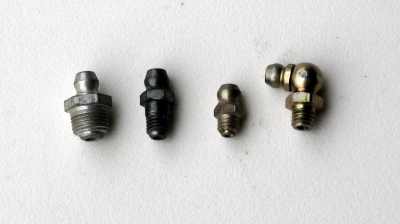
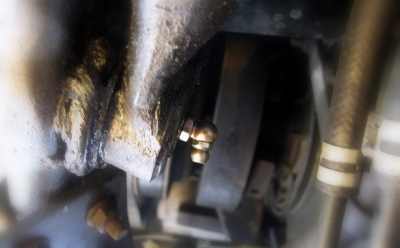
You can buy these fittings with different angles... An RVing tip that I learned when I was offroading in my old Chevy Blazer is that you can change this zerks out... just unscrew the old fittings and replace them with ones that will allow better access to your lube-gun.
Your motorhome awning also needs to be looked at. First of all, you want to roll it out and ensure that there are no leaves, twigs, etc on/in it. Sweep this stuff away and then clean the top and bottom with an appropriate cleanser. The RVing tip here is, when tearing down your campsite, to use a broom and remove all the leaves and any foreign debris that may have settled on you awning.
You also want to make sure that it is completely dry before closing it up for the winter. You don't want a mold issue developing over the months. Spray your mechanical parts with a good dry lube is always a good idea
You shouldn't have to do too much to winterize the sliders (if you have any). Motorhome slides should be okay. However, you may want to wipe down the hydraulic/mechanical jack rods with a good dry lube.
You do not want excessive dirt building up on this stuff. Here's an RVing lesson that can be hard earned. Get in the habit of checking your owner's manual. Sometimes we wait until the last resort to break out the books. We could save a lot of time if we just looked to the manufacturer for information. These books will tell how often you will need to re-apply a fresh lubricant on any gear drive.
Some people leave the slides out in camping mode, and some like to leave them in. If you want to leave them out, make sure they are well supported and level. Your RVing tip here is to put priority on cranking them in and out a couple times during the winter season. This will keep them free from binding up.
because you will have less exposure to the elements.
There are lots of good dry lubricants out there. The RVing tip is to understand why dry lubes are preferred over other "wet" lubricants. Simply put, dry lubes don't attract dirt and will not crude up as fast. A good dry lube that help complete your winterizing project by preventing moisture and rust. And, like it is stated above, this is a good lubricant because it will not attract dust and dirt.
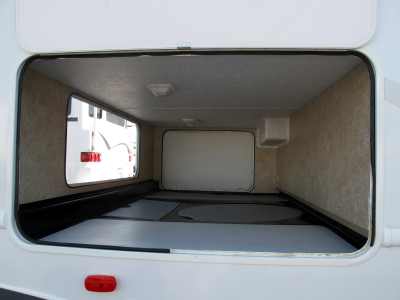
Check the seals around the storage compartments. They may have become torn or are starting to lift off. You can replace or reseal them as necessary. You will want to make sure, after you have cleaned any rubber seals, that you put a good conditioner like glycern on them. Here are some RVing Tip on how the many Glycerin uses may surprise you!
The real RVing tip here is... you can get a small bottle of Glycerin from Rite Aid for just a couple of bucks. This works well as a rubber lubricant and conditioner. No kidding, I've been using this stuff for years when I replaced radiator hoses.
Just put a little on the inside of the hose end and it slips right on. Anyway, the idea is to keep your compartment seals for drying out. Simply rub a small amount on these rubber gaskets and wipe off the excess. In fact, another RVing tip that you can also use this stuff to help treat dried chapping hands. Just work it in like a hand lotion.
On A Regular Basis
Last but not least is your motor-generator (M-G). You can easily overlook this vital piece of equipment. Sometimes, it seems that we do not think of the thing until it refuses to start. Then it's going to be too late!
At any rate, you want to keep an eye on potential exhaust leaks. You want to see if any holes have opened in the gen-set compartment that could give the exhaust access to the interior of the rig. You never know when and where a mouse may chew a hole. These critters have no respect. On rare occasions if these critters have been busy, you may be able to detect a louder than normal gen-set when it is running. That would be a clue.
To tell you the truth, I don't see a lot of issues here. However, you must consider the possibility for these types of problems because C02 is deadly in an enclosed space.
make sure that your propane gas detector, and if you have one, your C02 detector, are functioning
A good RVing tip would be to change their batteries on a daylight savings time schedule... you want to make sure you have fresh batteries for these devices next spring.
Make sure the air intake on your (M-G) is not blocked by dirt and debris. This would also be a good time to change the oil... for the same reasons you want to change the oil in the RV's big V8/10. Again, a good rving tip would be to check with your owner's operating manual for specifics on what type of oil to use in the specific conditions that you may find yourself... remember, on the road, conditions may/will change.
Under extreme cases, to winterize your (M-G) properly, a good steam cleaning may be a good idea. If you have been out dirt biking in the desert... well, you know what it's like.
Something else that can be easily overlooked is the need to run your (M-G) on a regular basis during the cold winter season. Onan recommends that your run your (M-G) at least 2 hours per month under a 50% load condition. I use a little 1500 W heater and turn on the air conditioner. This will give me roughly a half load. The RVing tip is to excercise the generator AND the airconditioner. If your AC sits for too long without running, the seals can dry out and you will lose your coolant. Running it keep everything in shape.
longer periods of time instead of many short durations.
Onan states that this is necessary because of moisture build up in the carburetor. Also, if you do not run your generator, the fuel will evaporate leaving unwanted deposits. This, of course, will make it hard to start next spring.
Most of this stuff is just common sense. Utilizing some of these tips will enable you to have piece of mind throughout the winter months. In fact, you probably can add to this list. Next winter if a concern pops into your head, write it down. If you develop a list of concerns that can be addressed on your terms, you will sleep better all winter... no tossing and turning wondering how the ol' RV is doing.
It is not fun to look out the window, and see your favorite toy sitting under two feet of snow and wondering about stuff. You should, instead, be planning your next year's travel schedule!

Return to Top Of Page
Leave RVing Tips That Will Get You Through The Winter And Return To RV Maintenance: Now That You Have Been Using Your Class C Motorhome...
Leave How Do We Winterize Our Class C Motorhome So That Will Be Ready To Get Down The Road Next Spring? And Return To The Class C Motorhome: How To Achieve The Maximum RV Lifestyle! Page
YOUR STORIES
Onan AC Generator Wouldn't Start
1995 Tioga Montara
Had a Leak - Ouch!
A Simple Way To Put An Electrical Thermostat On A Small Space Heater
In A Truck Camper!
A Great Destinaton, With An Unexpected Outcome!
INTERNET SALE!!
Now Available From Magellan! - RoadMate RV9145-Lm 7" Touchscreen GPS W/Lifetime Maps Portable Receiver Made For Motorhomes...
With an Internet Price Of Just $249.08 At Camping World!
Including Lifetime Maps!
Test Link
Below: For An Alternative Destination... A Four Mile Hike Around Sugar Pine Reservoir
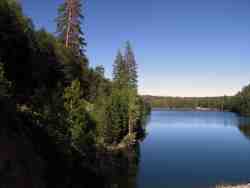
A Good Place To Begin The Joshua M. Hardt Memorial Trail Is At The Dam. This 3.5 Mile Trail Is Good For Foot Traffic And Bicycles... No Motorized stuff
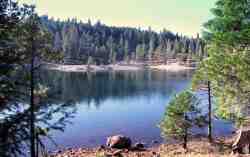
The Manzanita Day Use Area Is A Good Place To Sit And Watch The Wind
Play With The Water!
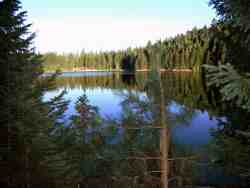
Another View From The Joshua M. Hardt Memorial Trail... Morning and Evening Are The Best Times To Hike This Trail. The Still Reflections Will Capture Your Attention
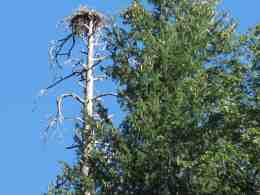
You May Want To Bring A Camera... There Are Large Birds Of Prey High In The Ski






